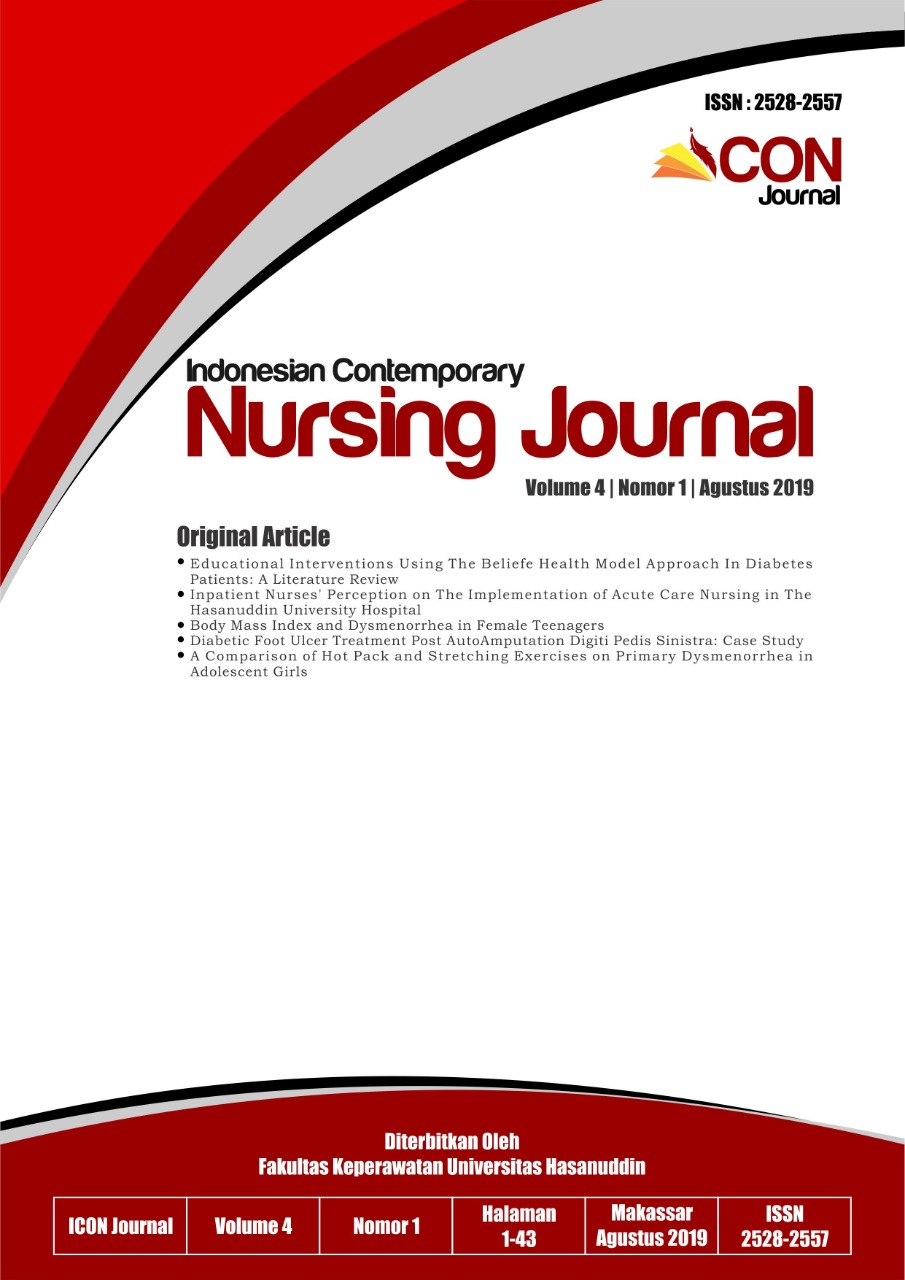Inpatient Nurses’ Perception on The Implementation of Acute Care Nursing in The Hasanuddin University Hospital
DOI:
https://doi.org/10.20956/icon.v4i1.3999Abstract
Introduction: Acute care is a type of time-sensitive care, this is due to an acute condition requiring rapid intervention. Acute conditions that exist in the inpatient unit would require special care in handling. This acute condition can affect many things, one of which is the patient satisfaction. With proper treatment for acute cases, the course will improve patient satisfaction itself. However, to date, acute care has been poorly defined and inadequately supported in most developing health systems. Aims of Study: This research aims to determine nurses’ perception on the implementation of inpatient acute nursing care in the Hasanuddin University Hospital. Method: This research was a qualitative method, data collection using individual interviews against ten participants (inpatient nurses) and validity checks of the data that utilizes something beyond the data. Data analyze used thematic analysis. Result: The results of the research yield four themes. Those four themes are perception of acute conditions, supporting factors in the management of patients with acute conditions, inhibiting factors in the management of patients with acute conditions, and nurses’ hope for acute care. Conclusion: From this research it is known that the incidence of acute conditions in the inpatient unit of Hasanuddin University Hospital less than chronic conditions. To handle acute cases, nurse in the inpatient unit take action early by monitoring vital signs, then immediately gave emergency action if necessary, while collaborating with the doctor. Supporting factors for nurses is the availability of emergency trolly, as well as cooperation among nurses who are good. Whereas the inhibiting factor is the number of nurses who are still lacking and the absence of code blue team. Advice from researchers, to health institutions is expected to be able to form a rapid response team (code blue), so that patients with serious/acute condition can be handled more quickly and efficiently, so that the implementation of nursing, especially nursing acute to run well and the nurse also will not experience in serving patients overwhelmed.
References
Anderson, N. (17 Maret 2011). List of acute diseases. Diakses tanggal 5 September 2016, dari website Livestrong.com - official partner of the livestrong foundation: http://www.livestrong.com/article/135273-list-acute-diseases/
Anjaryani, W. D. (2009). Kepuasan pasien rawat inap terhadap pelayanan perawat di RSUD Tugurejo Semarang (Tesis). Universitas Diponegoro, Semarang.
Bauk, I., Kadir, A. R., & Saleh, A. (23 Juli 2013). Hubungan karakteristik pasien dengan kualitas pelayanan: persepsi pasien pelayanan rawat inap RSUD Majene Tahun 2013. Diakses tanggal 5 Januari 2017, dari website E-Journal Program Pascasarjana Unhas: http://pasca.unhas.ac.id/jurnal/files/dc1197b354ffd8ddac0952874bd9475c.pdf
Creswell, J. W. (2013). Qualitative inquiry & research design third edition. USA: Sage Publications.
Mayasari, A. (2009). Analisis pengaruh persepsi faktor manajemen keperawatan terhadap tingkat kepuasan kerja perawat di ruang rawat inap RSUD Kota Semarang (Tesis). Universitas Diponegoro, Semarang.
Natasia, N., Loekqijana, A., & Kurniawati, J. (2014). Faktor yang mempengaruhi kepatuhan pelaksanaan SOP asuhan keperawatan di ICU-ICCU RSUD Gambiran Kota Kediri. Jurnal Kedokteran Brawijaya, 28(1), 21-25.
Nazri, F., Juhariah, S., & Arif, M. (2015). Implementasi komunikasi efektif perawat-dokter dengan telepon di ruang ICU Rumah Sakit Wava Husada. Jurnal Kedokteran Brawijaya, 28(2), 174-179.
Pribadi, A. (27 Desember 2010). Analisis pengaruh faktor pengetahuan, motivasi, dan persepsi perawat tentang supervisi kepala ruang terhadap pelaksanaan dokumentasi asuhan keperawatan di ruang rawat inap RSUD Kelet Provinsi Jawa Tengah di Jepara. Diakses tanggal 24 Januari 2017, dari website Diponegoro University Institutional Repository: http://eprints.undip.ac.id/16228/
Price, J. W., Applegarth, O., & Price, J. R. (2012). Code blue emergencies: a team task analysis and educational initiative. Canadian Medical Education Journal, 3(1), 4-20.
Rachmanta, R. (11 Desember 2015). Panduan troli emergensi. Diakses tanggal 24 Januari 2017, dari website DocSlide: http://documents.tips/documents/panduan-troli-emergensi.html
Rudyanto, E. (12 Juli 2013). Hubungan antara kecerdasan emosi dan kecerdasan spiritual dengan perilaku prososial pada perawat. Diambil kembali dari UPT Perpustakaan Universitas Sebelas Maret: https://eprints.uns.ac.id/2449/
Stöppler, M. C. (7 Juni 2015). What does code blue, code black, and code red mean? Diakses tanggal 5 Januari 2017, dari website MedicineNet.com: http://www.medicinenet.com/meaning_of_code_black_and_code_blue/views.htm
Triwidyawati, D., Kristiyawati, S. P., & Purnomo, S. C. (2013). Hubungan kepatuhan perawat dalam menjalankan SOP pemasangan infus dengan kejadian phlebitis. Diakses tanggal 5 Januari 2017, dari website STIKES Telogorejo Semarang E-Journal System: http://182.253.197.100/e-journal/index.php/ilmukeperawatan/article/viewFile/114/140
WHO. (22 Juli 1946). WHO definition of health. Diakses tanggal 4 September 2016, dari website World Health Organization: http://www.who.int/about/definition/en/print.html
WHO. (31 Januari 2013). Health systems and services: the role of acute care. Diakses tanggal 26 September 2016, dari website Bulletin of the World Health Organization: http://www.who.int/bulletin/volumes/91/5/12-112664/en/
Yusuf, S. (2011). Profil diare di ruang rawat inap anak. Sari Pediatri, 13, 265-270.
Downloads
Published
How to Cite
Issue
Section
License
Authors who publish with this journal agree to the following terms:Authors retain copyright and grant the journal right of first publication with the work simultaneously licensed under a Creative Commons Attribution License that allows others to share the work with an acknowledgement of the work's authorship and initial publication in this journal.
Authors are able to enter into separate, additional contractual arrangements for the non-exclusive distribution of the journal's published version of the work (e.g., post it to an institutional repository or publish it in a book), with an acknowledgement of its initial publication in this journal.
Authors are permitted and encouraged to post their work online (e.g., in institutional repositories or on their website) prior to and during the submission process, as it can lead to productive exchanges, as well as earlier and greater citation of published work (See The Effect of Open Access).


